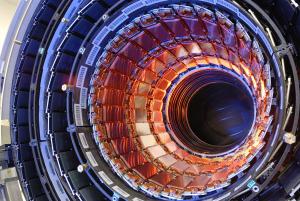Compact Muon Solenoid experiment at CERN

CMS stands for Compact Muon Solenoid:
compact because it is “small” for its enormous weight, Muon for one of
the particles it detects, and solenoid for the coil inside its huge
superconducting magnet. It is a high-energy physics experiment in Cessy,
France, part of the Large Hadron Collider (LHC) at CERN.
CMS is designed to see a wide range of particles and phenomena
produced in high-energy collisions in the LHC. Like a cylindrical onion,
different layers of detector stop and measure the different particles,
and use this key data to build up a picture of events at the heart of
the collision.
Scientists then use this data to search for new phenomena that will
help to answer questions such as: What is the Universe really made of
and what forces act within it? And what gives everything substance? CMS
will also measure the properties of previously discovered particles with
unprecedented precision, and be on the lookout for completely new,
unpredicted phenomena.
With an international structure, more than three thousand physicists
and engineers work in CMS, IFCA's contribution has been centered in the
development and construction of an alignment system for the muon
chambers of the detector. We have also participated in the development
of a Tier-2 facility to analyze the huge amount of data produced during
collisions, by means of GRID applications. The Physics channels in which
our group work are: Higgs, SUSY and top, preferably with two isolated
leptons in their final state.
Our involvement in responsability posts start with Prof. Teresa
Rodrigo who is nowadays the chairperson of the collaboration Board of
the CMS experiment. Furthemore, Dr. Gervasio Gómez is the person in
charge of the Global Muon Alignment effort in the colaboration, while
Prof. Francisco Matorras is the person in charge of our Tier-2 facility
in the LHC Grid Computing.
One of the main goals for the year 2012 is to confirm or reject the possible signals of a Higgs boson observed in 2011 LHC data.
